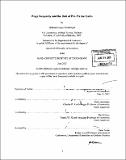Wage inequality and the role of pre-market skills
Author(s)
Steinberger, Michael Douglas
DownloadFull printable version (6.265Mb)
Other Contributors
Massachusetts Institute of Technology. Dept. of Economics.
Advisor
Daron Acemoglu and David Autor.
Terms of use
Metadata
Show full item recordAbstract
This dissertation consists of three empirical studies, each using a measure of pre-market skills to examine an aspect of wage inequality in the U.S. labor market. Chapter One analyzes the factors associated with the change in the gender wage gap for young workers. I decompose the change in the gender wage gap over the entire wage distribution into factors associated with education, pre-market skills and the minimum wage. Improvements in education explain nearly all of the fall in the gap for the top three quarters of the distribution, leaving a small role for beneficial unexplained factors that led to excess shrinking of the gap. Women in the bottom quarter of the distribution actually experienced residual increases in the gender wage gap, and the gap rose outright for women in the bottom decile of the distribution. The fall in the real value of the minimum wage is discussed as a plausible explanation for the residual increase in the gender wage gap for low-earning women. Chapter Two evaluates the increase in the return to college between 1979 and 1999. Improved sorting of highly skilled individuals into college over the period implies that the composition of unobserved skill across education groups is not time invariant. Despite the increase in college attendance, college degree holders in 1999 had higher measures of pre-market skills than degree holders in 1979. For new labor market entrants, improved skill sorting accounts for four to nine percent of the increase in the return to college over the period. Accounting for improved sorting and the increased return to these skills reduces the estimated increase in the return to college by one third for males and one sixth for females. (cont.) Chapter Three explores the wage premium associated with on-the-job computer use. I show the computer wage premium does not appear to be simply the result of a spurious correlation with typically unobserved cognitive and interpersonal skills. For males and females, the return to on-the-job computer use falls by less than 15% after controlling for worker heterogeneity in pre-market skills. Controlling for education, workers using a computer at work do not receive a higher wage premium for their other productive skills.
Description
Thesis (Ph. D.)--Massachusetts Institute of Technology, Dept. of Economics, 2005. Includes bibliographical references.
Date issued
2005Department
Massachusetts Institute of Technology. Department of EconomicsPublisher
Massachusetts Institute of Technology
Keywords
Economics.